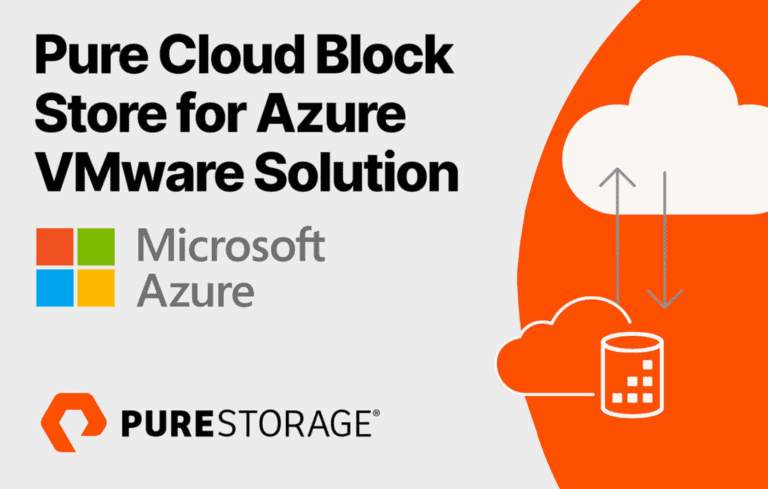The expanding partnership between Microsoft and Pure Storage brings benefits of Pure Block Store to VMware environments on Azure.
Pure has long offered Cloud Block Store with both Azure and AWS. This allows customers to reduce their block storage costs considerably, according to Pure. In addition, customers can also take advantage of all the services Pure can provide in this regard from a SaaS approach. These include services around ransomware and/or disaster recovery. As of now, these capabilities are also available for Azure VMware Solution (AVS). This should lead to customers migrating their block-storage workloads to the cloud easier and faster.
Better scalability
AVS uses a hyperconverged architecture within Microsoft Azure. One of its drawbacks is that it doesn’t scale as well. That is, if you are going to scale up, you have to scale up not only storage, but also compute. That creates a hefty bill at the end of the month or the end of the year for organizations, when the extra compute is not even needed.
To solve this problem, Pure worked with Microsoft to link Cloud Block Store and AVS within the space of a few months. This extension of the existing collaboration between the two parties disconnects storage from compute. “Without Pure, you very quickly have to go to a lot of AVS nodes,” according to Remko Deenik, Technical Director Europe at Pure Storage. We spoke to him briefly in response to this news. Obviously, organizations don’t want to go to many more nodes simply because it’s too expensive. With Cloud Block Store coupled with AVS, you have to purchase far fewer of them. He talks about savings between 42 and 56 percent. “The cloud therefore doesn’t necessarily have to be expensive,” he adds.
For Microsoft, by the way, this does not mean that customers will spend less on Azure. You might think so, given the primarily cost-driven narrative. Many customers operate within Azure with a so-called committed spend, an amount they spend on Azure anyway. The new pairing between Pure and Microsoft allows them to take that spend elsewhere within the Azure environment.
TIP: “Storage is the only industry where 10x better doesn’t convince”
Access to services from Pure
The added value of pairing Pure and AVS is first and foremost in cost savings, that much is clear. That starts, as already indicated, by pulling storage and compute apart. In addition, joint customers can use Pure’s compression and deduplication technologies for data reduction for VMware workloads in Azure. There’s also an integration within this new offering with Premium SSD v2, the latest storage solution within Microsoft Azure. This should also reduce infrastructure costs by two-thirds, according to Pure. These cost reductions should allow customers to migrate to the cloud faster and better.
It’s not just about cost, however. Pure also offers a variety of additional services within Purity, the company’s OS. These include Pure Storage Safemode Ransomware Data Protection. This offering lets you continuously protect and instantly restore data snapshots. This service was already available to Pure customers with on-prem VMware environments on FlashArray, so now it can also be used within the new integration between AVS and Cloud Block Store. On the DR front, Purity Data Services such as ActiveCluster, ActiveDR and Purity CloudSnap are also available. These should make it possible for data to always be secured optimally and in the right place.
Finally, Deenik also points to the availability of VM Analytics within this new partnership. Pure already offered this for on-prem VMware environments, but now it will also be available for AVS. With VM Analytics, you can now troubleshoot properly in the cloud, something that has always been very difficult. The goal is to provide end-to-end visibility into everything. This service is provided entirely by Pure, but is based on metrics from VMware. Pure consolidates those into a single environment. It’s therefore not about new data, but rather presenting existing data better.
Pure Storage Cloud Block Store for AVS is currently in public preview for customers of both companies.
TIP: Pure Storage wants to make hard drives permanently obsolete
